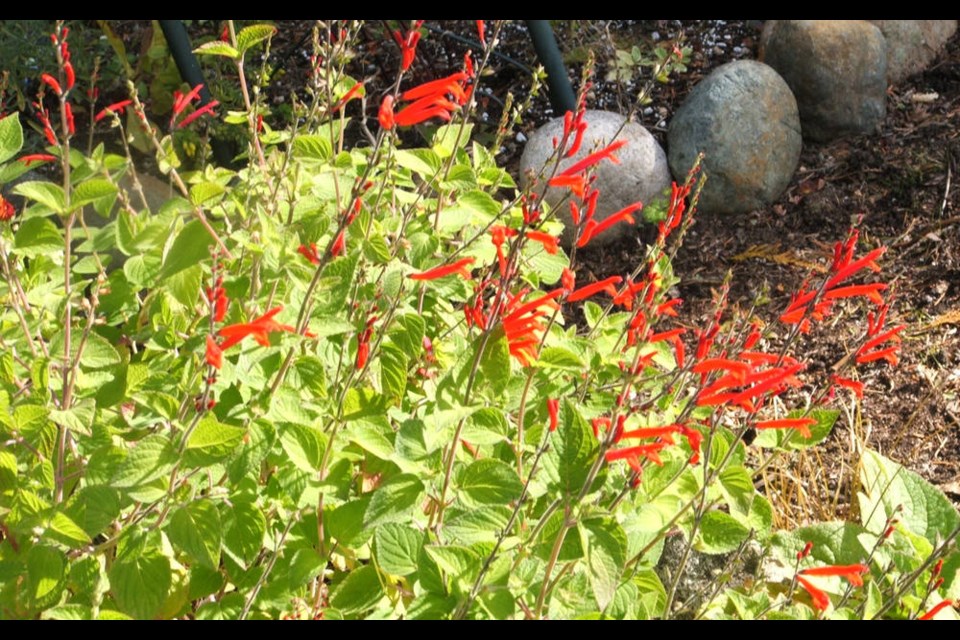Dear Helen: I’ve heard that certain salvias are among the best plants for attracting and nourishing hummingbirds. Which ones, in your opinion, are the most effective for this purpose?
L.B.
The autumn sages (Salvia greggii) are fine hummingbird magnets. They have aromatic leaves that are used as seasonings, and the flowers are edible. They are not all hardy though. In the spring, check labels for the hardiness of the plants you find. In my garden, a form of pineapple sage called Honey Melon is a star for attracting hummingbirds. My clump, in a sunny, hot location, blooms all summer and for most of the autumn. Last week I busied myself reconfiguring nearby vegetable plots and enjoyed the broad clump still full of bright red flowers. The intense pineapple scent of the foliage is a delight. The flowers are edible. I see hummingbirds often in and around the plant.
Honey Melon is far hardier and longer in bloom than the species pineapple sage (Salvia elegans), a plant that, in my garden, often did not even begin blooming until around the time of the first fall frost.
The sage that is actually called Hummingbird Sage is Salvia guaranitica ‘Black and Blue.’ This is a tall plant, a metre or more high, with deep blue and black flowers on long spikes.
Black and Blue sage has proved to be very hardy. Last year I planted it, together with a hardy autumn sage called Lemon Light, in a big old metal wash tub. I was surprised that both plants re-grew in the spring, in an unprotected container, to give another long season of bloom. I have noticed hummingbirds darting around the flowers often.
Tubular, nectar-rich flowers are preferred by hummingbirds, and red flowers are most attractive to them though they also feed from orange, pink, bright yellow, deep blue and even some white blooms. Fuchsias are favourites too. Hummingbirds are frequent visitors to a hardy fuchsia growing next to the patio. The shrub produces a long season of tubular white flowers.
Autumn sages, Black and Blue, and even Honey Melon are available in some garden centres in the spring. Richters, a Canadian source for an very extensive selection of herb plants and seeds, lists all of them.
Dear Helen: Can you explain the “strawberry” in the name “strawberry tree?”
T.N.
The reference is to the small, red, berry-like fruits that appear in autumn, along with clusters of white flowers. The botanical name is Arbutus unedo The descriptive term unedo is said to come from unus, meaning one, and edo, to eat, a sort of advice to eat only one — either because the fruit is mealy and tasteless, or because more might be unhealthful.
HCP events. The Horticulture Centre of the Pacific is offering the following courses. For details and online registration go to hcp.ca/events to find a calendar. Click on a course to access its details. Or, the site’s home page lists courses along the right hand side. For safety regulations during the pandemic, type “Horticulture Centre of the Pacific + COVID rules” into a search engine. Register online or by phone: 250-479-6162.
• Terrariums for kids, Sunday, Nov. 22, 10:30 a.m. to 12 p.m. for children age five and up. Parents are welcome to attend. Those under seven must be accompanied by an adult. Cost to HCP members $20, others $25.
• Outdoor Fairy Gardens, Sunday, Nov. 22, 1:30 to 3 p.m. Same costs and age considerations as the terrarium program.
• Wreath Making With kids, 1:30 to 3 p.m. on either Saturday, Nov. 28, Thursday, Dec. 3 or Saturday, Dec. 5 for children six and up, each accompanied by an adult to assist. $25 per child.
• Holiday Miniatures and Cards, Tuesday, Nov. 24, 10:30 a.m. to 3:30 p.m. Paint watercolour miniatures that can double as greeting cards. Instructor Richard Wong. Bring lunch and a mask. Fee is $85.
• Wreath Making. Registration is now open for adult wreath making workshops from Nov. 25 to Dec. 6, 10 a.m. to 12:30 p.m. Bring a mask. Members $45, others $55.
• Plant Identification and Culture with Diane Pierce, a monthly course that can be joined at any time. Next available session is on Sunday, Dec. 13, 1 to 4 p.m. Twenty-five new plants discussed at each session. Bring a mask. Member/other cost per session $35/$45, for 12 sessions $350/$450.



